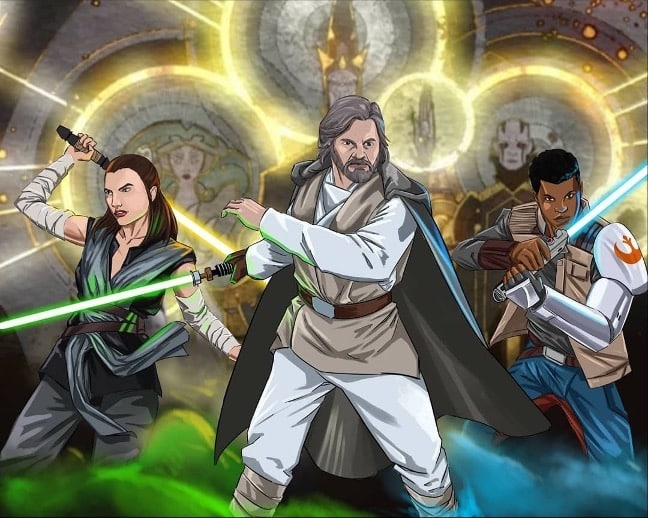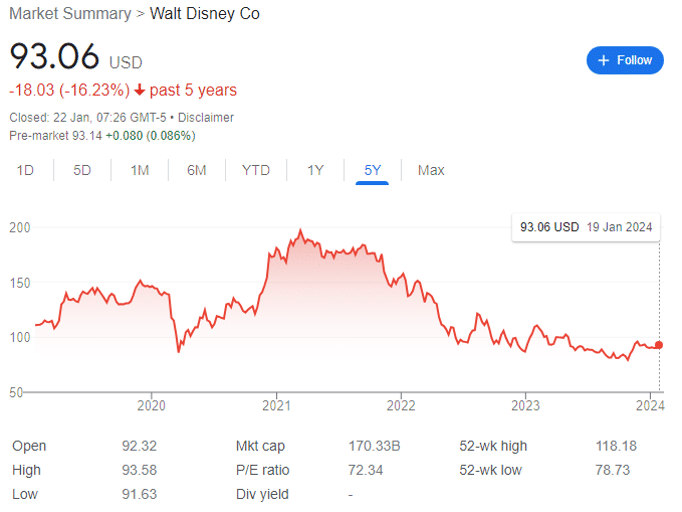Disney shares are heavily undervalued and are my top blue chip pick for 2024. Here’s why.
Longtime readers at Investing Strategy will know my investing strategy for excess capital: a big chunk in an S&P 500 tracker, a little into gold and major cryptocurrencies, and then the remainder into a portfolio of circa 20 small cap companies. Doubtless this strategy will change the older I get — as a general rule, the closer you get to retirement, the less risk you will be taking on.
However, I do invest in singular blue chip companies where I feel the value is exceptional and the stock beaten down by sentiment rather than fundamentals.
In 2023, I picked Rolls-Royce, Meta Platforms – and also Marks & Spencer due to a tip from a fellow analyst. These returned 221%, 178% and 106% in the year; clearly, it’s not just the small caps where explosive growth can be found.
Of course, while small caps generate capital returns through true growth, the blue chips often rise either because of external catalysts (Nvidia for example through the AI boom) — or else, because they were simply fundamentally undervalued by the market.
Rolls is developing tech that would be world news if it were being developed at Tesla and also controls a huge percentage of the civil aviation sector. Meta’s family of apps are used by billions of people, and MKS enjoys a premium market position.
There is a common thread through all three though — you needed a strategic shift to force the market to appreciate the underlying fundamental value.
Rolls-Royce got Tufan ‘Turbo’ Erginbilgic in as CEO at the start of last year, who promised to save the ‘burning platform.’ He may have gone too far by firing too much institutional knowledge though — and plans to scale back up with a new site in Cardiff signal that the company will soon start to feel this. The 400p share price target is too ambitious and I expect Rolls to end 2023 below 300p.
Meta did not see an executive change, but CEO Mark Zuckerberg decided to stop banging on about the Metaverse and instead decided to go for some serious job cuts. Of course, he’s continued to spend about $1 billion a month on Reality Labs, but the messaging changed, and this was enough for investors. Having tried the Meta Quest 2, I do think the spending is justified and will pay off in the next bull run — however I also think Meta is being buoyed by the AI bubble and is no longer excellent value.
Marks & Sparks similarly got a new CEO in the form of Stuart Machin in May 2022. While Stuart had done stints at other UK retailers, it was the 10 years at ASX giant Wesfarmers that sold me that he could achieve a turnaround and send MKS back into the FTSE 100. This has now been achieved.
Now it’s Disney’s turn.
Disney shares: the bull case for 2024
When I’m considering a big investment in a blue chip, I want to see the following: the company has strong heritage power, has been led into the doldrums by a misguided CEO (often someone who has been at the helm too long, but had previously done an excellent job), and is showing signs of recognising a need for change.
Disney fits these criteria perfectly. It owns childhood nostalgia, those awesome theme parks, Star Wars, Marvel, most of ESPN…et cetera. Naming every brand in the Disney portfolio would possibly be overkill, but it’s probably worth looking at a few to see what’s gone wrong:
Childhood nostalgia: essentially, the animated films. Solid entries came in right until 2019 — but then CEO Bob Iger stepped down in February 2020. Yes, there was a pandemic, but the films themselves thereafter were rubbish.
Between 2016 and 2019, you had Zootopia, Finding Dory, Moana, Cars 3, Coco, Incredibles 2, Ralph Breaks the Internet, Toy Story 4, and Frozen 2. Most were sequels, but they were hit after hit. Between 2020 and 2023, (from memory) you got Onward, Raya and the Last Dragon, Encanto, Lightyear, Strange World, Elemental and Wish.
Encanto did well — but you may not even have heard of the rest. Lightyear — a Toy Story spinoff — was reviewed by The Guardian as ‘a trudge through outer space,’ losing $106 million for the company against a $200 million production budget. That’s a huge fail for a well-loved franchise.
I have children, they watch Disney films — and nothing since the start of 2020 has been rewatched more than once.
Then there’s the theme parks — they have always been expensive, but the problem now is they are no longer value for money. Costs have skyrocketed, but the experience has declined significantly.
The new Genie+ system is embarrassing, you wait over an hour to go on rides because the company does not limit visitor entry to correspond to staffing levels — the food quality has gone down sharply and customer service non-existent. I went to Disney World during a road trip of 48 US states in the 2000s and it was expensive but awesome. Now the experience does not match the increasing price tag — and all you need to do is read the reviews.

Star Wars: The Force Awakens (2015) was a pleasant, if generic, film to watch. The sequel was marmite at best, and the Threequel ‘The Rise of Skywalker’ was appallingly bad. Forget the fact that all three directors were seemingly making whatever they wanted with no oversight or consistent storytelling…
You had all three original trilogy actors: Mark Hamill, Carrie Fisher, and Harrison Ford reprising their roles, and at no point did anyone decide to put all three in one scene together.
You know what I wanted to see Disney? I wanted to see Jedi Grandmaster Luke Skywalker taking down an entire army while a modernised version of the Force Theme blared through the speakers, while everyone from the age of nine to ninety went absolutely nuts.
In fact, (MARVEL SPOILERS BELOW),

that’s what happened when Thor arrived in Avengers: Infinity War, what happened when Tony Stark snapped his fingers in Endgame, and what happened when all three spidermen swung in No Way Home.
We want to be entertained by an entertainment company.
I know.
Shock.
Horror.
Marvel has more plot holes than a Swiss cheese, but it used to be fun. Yes, there have been some cracking instalments after Endgame such as GOTG 3 or Shang Chi — but mostly it’s been poor film-making — and many loyal fans have given up entirely. Again this may feel subjective, but the box office numbers are not.
And it’s not superhero fatigue. It’s just weak movies that are not worth the price of admission.
Here’s the thing: I am not going to get into arguments around woke messaging (Disney films have always had subliminal messaging — and historically, some of it racist, sexist, or otherwise less than impressive), but the films themselves were always entertaining.
This brings me to my next point. Disney needs to scrap Disney+. It’s a film company, not a TV company. Disney+ is tarnishing the brand in multiple ways: to start with, you need to spend movie numbers of dollars to deliver the same quality but even then you don’t generate the same revenue. Even this does not guarantee success — She Hulk (ironically an abomination of the silver screen) — cost over $200 million to produce nine episodes and failed in every single way. Story, CGI, humour…everything.
Then there’s the quantity dilemma. Let’s take Marvel and Star Wars. I enjoyed WandaVision, Moon Knight, and the first two seasons of The Mandalorian. I really did. But when you have a monthly subscription, you need to justify the continued spend in your household budget — against the likes of Netflix for example.
Disney decided the solution was to make so much content — seemingly without any quality checks whatsoever — that it was overwhelming to stay caught up. And worse, when a character which had seen character development in a series (like Wanda) was next used in a film, they threw this development out of the window.
This means that viewers are continuing to get character whiplash, but worse, you feel like you need to watch three or four films, six series, and various other bits of media to keep up with each of the various Disney cinematic universes.
Four years ago, there was one or two films a year and these were genuine cinematic events where everyone knew what was going on and there was an overarching storytelling destination. Now, it just feels like completing side quests after finishing the main game plot.
Disney’s turnaround
Iger was replaced by Bob Chapek in February 2020 — but returned in November 2022 as his successor had essentially destroyed his legacy. Yes, the theme parks were shutdown for some time, and yes, the share price soared on cheap money in 2021 — but the downwards spiral was set in.
Possibly the highlight of the incompetence came when Scarlett Johansson sued the company for breach of contract by releasing ‘Black Widow’ on Disney+ at the same time as theatrically. Obviously, streaming cannibalised cinema ticket sales — and the end result was that the actress made far less than expected as her contract was for an exclusive theatrical release window with her pay based largely on box office performance.
Johansson was not at this point a new breakthrough actress — her films have grossed close to $15 billion, making her arguably the highest grossing box office star of all time. Picking a financial fight with this particular star power, who has symbolically represented women in the MCU for a decade, was corporate stupidity at its finest.
But we are where we are. The stock fell below $80 per share at points in October 2023, and I bought a sizable amount for my SIPP as a long-term investment at circa $84. It’s since recovered to $93, and I think a significant recovery is underway.

Why?
Forget the finances — management have accepted there is a problem that needs to be rectified. In November 2023, Iger admitted on the earnings call that ‘quantity can be actually a negative when it comes to quality, and I think that’s exactly what happened, we lost some focus.’
The plan now is to make fewer films. And it’s a familiar strategy: Iger initially took the CEO reins in 2005 and did the exact same thing after a string of box office bombs — cutting 650 jobs and halving film output. He also acquired Pixar (think Toy Story, then Frozen and Zootopia).
And the company recovered fast.
2024 will see just one Marvel film: Deadpool 3, and arguably this is just its own thing. Iger now thinks that ‘our performance from a quality perspective wasn’t really up to the standards that we set for ourselves… we’re looking to and working to consolidate, meaning make less, focus more on quality.’
2019 compared to present day
The ‘live-action’ Lion King in 2019 made Disney $1.6 billion — the highest grossing animation ever. But other than the Avatar sequel, the company hasn’t managed to gross over $1 billion since the Star Wars atrocity in 2019 (imagine if they had made it properly?). In 2019, nine films grossed more than $1 billion, and Disney released seven of them.
Did you watch The Haunted Mansion? How about Indiana Jones and the Dial of Destiny? The Marvels? The worst opening weekend for Marvel ever, after the absolute rubbish that was Thor: Love and Thunder and Antman and the Wasp: Quantumania.
For reference, Chris Hemsworth (Thor actor) is on record as saying that the movie was ‘too silly,’ while Disney execs genuinely thought that the Antman release would be a hit, despite deciding to remove its heart by excluding Michael Pena and not bothering with the ‘modern family’ set-up that made the first two movies endearing to watch.
Indeed, the last time Disney managed to report positive operating income from its all-important Content Sales/Licensing and Other division was in fiscal Q2 2022.
Now, Disney expects to appoint a new CEO in early 2025 to replace Iger — who in reality has simply returned to steady the ship (probably for a bucketload of cash, and possibly to rebuild his legacy). The man is 72 years old and while this may appear young compared to US politicians, my perception is that he would quite like to retire.
You need someone with the energy to bring the magic back. This may be 54-year-old co-Chairman Alan Bergman — who has a background as a CFO rather than as a creative — has leadership experience at Disney, and will allow the creative names such as Kevin Feige, Jennifer Lee and Pete Docter to do what they do best without the unnecessary meddling that has been the hallmark of prior management.
For context, Bergman consistently disagreed with Chapek’s decision to reduce studio executive budgets for films — this decision was finally reversed by Iger in 2023 — but did significant damage. In other words, the company kept spending money where the returns were dubious, while bean counting where extra money would deliver the $1 billion+ movie revenue.
Indeed, I would not be surprised to see Bergman replace Iger this year, with the latter staying on to mentor and advise through a transition period. The man knows how to turn this ship around, and with it, Disney’s share price.
This article has been prepared for information purposes only by Charles Archer. It does not constitute advice, and no party accepts any liability for either accuracy or for investing decisions made using the information provided.
Further, it is not intended for distribution to, or use by, any person in any country or jurisdiction where such distribution or use would be contrary to local law or regulation.
[1] Start investing: 5 steps to consider for 2023’s bear market (investingstrategy.co.uk)
[2] FTSE 100: Rolls-Royce share price to soar in 2023? – IG UK
[3] (2) Episode 4 – The TikTok IPO – by Investing Reviews (substack.com)
